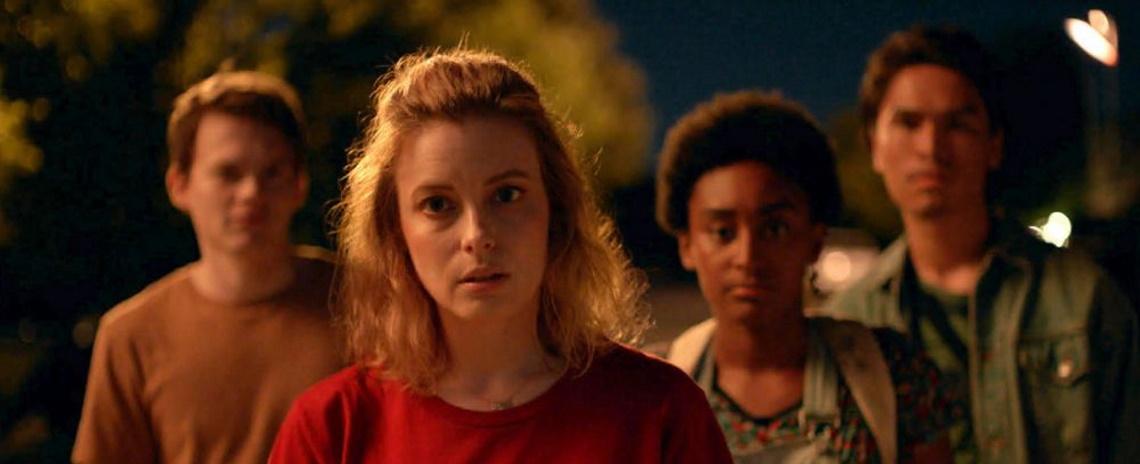No author likes finding out their book is no good. After months or years of laboring over a manuscript, hoping someone somewhere will get something out of it, there isn’t space to consider the possibility that the resulting book might be bad. It’s the kind of intrusive thought that can derail the entire writing process. Although there’s no opportune moment to learn that one’s debut novel is, in fact, a dud, it’s hard to imagine a more awful time than on the brink of a nationwide book tour shortly after publication. Alas, this is precisely the experience of Kate (Gillian Jacobs), a writer in her mid-30s who has just been dumped by her fiancé and now faces a similar uncoupling with her publisher. It’s the first event in a sequence of increasingly unfortunate ones portrayed in Kris Rey’s latest tragicomic mumblecore entry, I Used to Go Here.
Readers who are not put off by the terrible cover of Kate’s novel Seasons Passed — which looks more like a beachy mass-market paperback from the grocery checkout than the weighty drama she thought she’d written — must confront overwritten prose and tired conventions on its pages. Kate appears sick of the novelist routine already, with the cancellation of her tour only making her relationship with her book even more strained. Perhaps that’s why, when her favorite creative-writing professor, the fawning David Kirkpatrick (Jemaine Clement), gives her a call and asks her if she’d like to do a reading at the university, she says yes without hesitation. When nothing’s really going well with the launch, it must’ve been nice to hear someone treating her work with genuine admiration. She packs her bag and heads from her Chicago apartment to her alma mater in Carbondale, eager to finally be extolled rather than reviled (for once).
On arrival, Kate takes nostalgic pleasure in revisiting the locales that populate her college memories. Her old hangout spots, her former dorm, her bars of choice: They’re all exactly how she’d left them 15 years before, radiating a stereotypical Midwestern small-town vibe that immediately feels like a home-away-from-home all over again. However, after an awkward encounter with Kirkpatrick and his wife, a cold response to her book reading, and a botched date with an old friend (Jorma Taccone), Kate’s feelings of inadequacy and loneliness — exacerbated by her routine scrolling through her ex’s Instagram — slowly start to creep back. Left down and out (and drunk) in the streets of Carbondale, Kate finds herself in front of the residence she used to share with her fellow creative-writing majors. Still affectionately dubbed the Writer’s Retreat by the new class of writers, the two-story building is now occupied by young men instead of young women. They invite her inside, initiating an entanglement that soon grows muddled as Kate reflects back on the person she was in her early 20s and ponders the course her life has taken since.
Many of the mumblecore movement’s founding filmmakers have shown promising signs of evolution in recent years, with several of their films — such as Greta Gerwig’s Lady Bird (2017), Andrew Bujalski’s Support the Girls (2018), and Alex Ross Perry’s Her Smell (2018) — tweaking the subgenre’s house style to make for more widely enjoyable films with something significant to say. However, notwithstanding the involvement of the Lonely Island — that uniquely goofy trio of comedians-turned-filmmakers Andy Samberg, Jorma Taccone, and Akiva Schaffer — I Used to Go Here is not similarly representative of a new direction for Rey. As such, the viewer’s opinion of the film is going to be completely dependent on their patience for the mumblecore genre’s intentionally meandering variety of cringe comedy. Like another recent addition, Sword of Trust (2019), I Used to Go Here represents an unabashed embrace of the subgenre’s tropes — a polished, confident McDonaldization of a story that offers exactly what one would expect.
Jacobs’ performance proves to be the film’s primary standout feature. A criminally underused actress in her own right who still hasn’t been given a real chance to shine after her tenure on NBC’s Community (2009-15), she tackles the lead role with exceptional prowess and know-how. Performances like the one she gives in I Used to Go Here only make the question of her relatively modest career all the more perplexing. Clement, although featured far less prominently than Jacobs, is also as entertaining as ever. He, like her, seems relatively comfortable in these types of microscopic films in the wake of a hugely successful cult series. Their participation makes the story quite engrossing, the sum of their talents far exceeding the film’s passable script and unremarkable supporting players.
For a film about authenticity and growth, there is a frustrating lack of both in I Used to Go Here. After setting up a story with the potential to interestingly explore the ways in which people fail their younger, more hopeful selves, the film quickly squanders this goodwill for a well-trod tale about an aimless single woman in her 30s who’s unsure of herself both personally and professionally. It’s more or less the same midlife crisis narrative that has been making the rounds for decades, but the genre seems to forbid any suggestion that Kate is going to evolve. It’s simply implied that she’s just going to accept her reckless (and oftentimes irrational) behavior as part of her identity. Even though Rey’s take is somewhat compassionate rather than excessively cynical — never turning Kate’s self-destructive tendencies into something degrading or hateful, as so many other dramedies about messy adults tend to do — I Used to Go Here and its conventional trappings will inevitably leave viewers feeling like they’ve been here before.
Rating: C+
I Used to Go Here is now available to rent from major online platforms.


